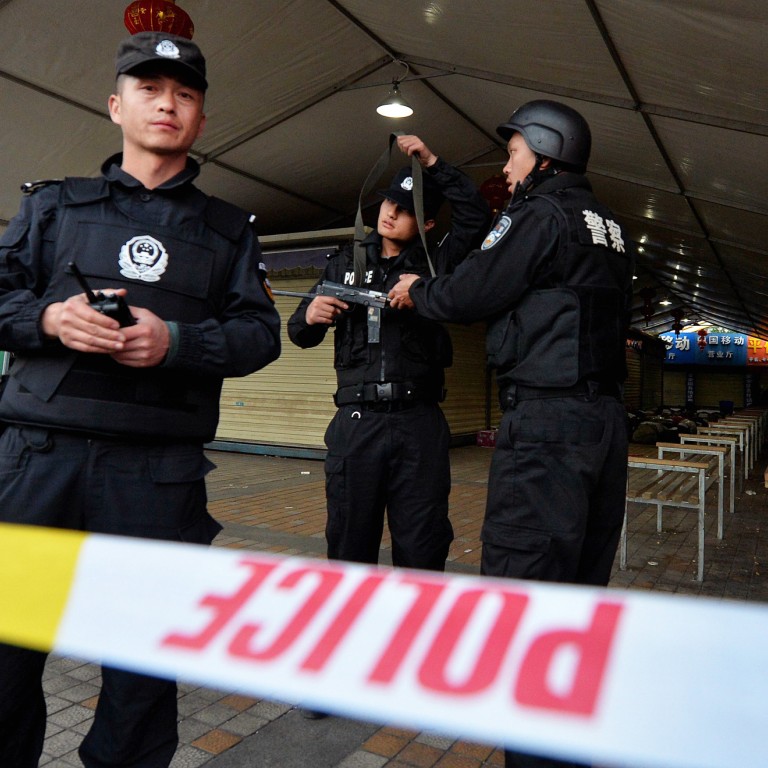
New | China withholds full details of 2014 domestic security budget
Province and regional figures missing from this year’s announced total for internet policing and surveillance
China left out major details from its domestic security budget this year, only announcing the total coming directly from central government of 205 billion yuan (HK$259 billion) and witholding what has usually been hundreds of billions in yuan more from the provinces and cities.
After three years in a row in which the domestic security budget drew headlines for exceeding the fast-growing military budget, the government this year did not publicise the overall figure despite a stepped-up focus on stability at home.
Analysts said the reason for the non-disclosure could be due to the sensitivity of the budget used for policing and surveillance, which some activists have criticised as tools for censorship and harrassment.

Domestic security spending covers everything from monitoring dissidents online and eavesdropping on journalists to trying to stop attacks like the one at the weekend in Kunming in which 29 civilians were killed by knife-wielding assailants.
The government last year announced at the annual session of the National People’s Congress, the largely rubber-stamp parliament, that the domestic security budget would rise 8.7 per cent to 769.1 billion yuan, the third year in a row it outstripped defence spending.
This year, it only announced the 205 billion yuan figure. That leaves a large sum unaccounted for, at an especially sensitive time after the government failed to predict or prevent two attacks it has blamed on militants from the far western region of Xinjiang, one in the heart of Beijing which authorities called a suicide bombing.
At the weekend, 33 people – including the Xinjiang militants shot dead by police – died in an attack at a train station in the southwestern city of Kunming.
“My guess is that [the failure to disclose the full amount] could be because this is a bit sensitive,” said Xie Yue, a professor of political science at Tongji University in Shanghai, speaking about the unannounced spending.
My guess is ,,, this is a bit sensitive ... because it’s used exclusively to maintain domestic order, which has raised suspicions this is a police state
“The domestic security budget is a sensitive issue because it’s been growing every year and it’s used exclusively to maintain domestic order, which has raised suspicions this is a police state.”
Premier Li Keqiang, in his wide-ranging address to the opening of the National People’s Congress annual session, vowed no let-up to protect social stability, a key watchword for Communist Party rule.
“We will strengthen comprehensive maintenance of public order, resolutely crack down on violent crimes of terrorism, safeguard China’s national security, create good public order, and work together to ensure public security in China,” he said.
Delegates who listened to Li’s speech at Beijing’s Great Hall of the People waved off reporters’ questions about domestic security spending or said they did not know.
A significant amount of domestic security money is spent on monitoring and curtailing the activities of dissidents, removing unapproved political content from the internet and other measures critics say have no obvious connection to maintaining law and order.

“It’s such a waste of money, to think that I’m a security threat,” Wu said. “I was told that the money they spent watching me was enormous – so much so that it was a secret and they [officials] could not tell me how much it was.”
China has actually downgraded the political role of its security apparatus, following the retirement of the powerful domestic security chief Zhou Yongkang in 2012.
The domestic security forces he ran suffered a humiliating failure when they allowed blind rights advocate Chen Guangcheng to escape from 19 months of house arrest and flee to the US embassy in Beijing, which also happened in 2012.
Such fumbles gave then-president Hu Jintao and his successor, current President Xi Jinping, a shared motive to put a growing array of police forces and domestic security services under firmer oversight.
Still, Xi in January took control of a new national security commission, to better co-ordinate both domestic and foreign threats.

